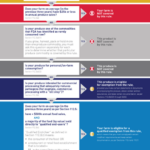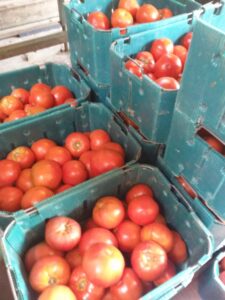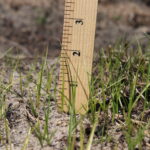Learn more about the weed nutsedge and appropriate management strategies based on the plants growth preferences and dislikes. These resources can be used to develop a short and long term management plan for nutsedge control. Visit the NJAES Weed Management YouTube playlist for a video presentation or download our nutsedge decision tool fact sheet. These resources are one of a five-part weed management series funded by USDA Specialty Crop Block Grant AM190100.
Non-Herbicide Nutsedge Management Resources for Specialty Crop Growers
NJ Bag Ban Update Impacting Direct Market Farms
We have continued to receive questions and comments about the NJ Bag Ban and its impact on farm markets. These questions and comments have been specifically focused on the fact that the ban does not clearly state what types of plastic bags can be used to bag exempted items, including produce. We have received mixed communication about the use of t-shirt style bags for exempted items. The original PPA post on the ban has been updated to reflect this lack of clarity about the enforcement of the bag ban on exempted items. We encourage farms using t-shirt style bags to communicate with their municipality or county, depending on who will be enforcing this ban at their sales locations, to find out how enforcement personnel plan to interpret the law. The law states that those who are out of compliance with the ban will be given a warning for a first offence, a $1000 per day fine for a second offence, and a $5000 a day fine per day for third and subsequent offences. We hope official guidance from DEP will be forthcoming to clarify the law section pertaining to plastic bags for exempted items. Information on the bag ban from the state can be found online.
Farms and the New Jersey Cottage Food Law – Q&A
New Jersey farms may be interested in adding Cottage Food products to their product line at their farm stands and markets. The Cottage Food Law is very specific about the types of products it covers, the total sales value of the Cottage Food products, and the production location of these products. Municipalities must be consulted prior to a permit application submittal, and we know of some instances where local ordinances and zoning have prohibited Cottage Food activities. Answers to some common questions are below.
What type of business can operate under the NJ Cottage Food Law?
Businesses who choose to produce products allowed under the law (see below), using a home kitchen, and who sell less than $50,000 of cottage food law covered products must comply with the provisions of the Cottage Food Law. The law allows production of the products listed below only in home kitchens. No other facilities may be used for the production of these Cottage Food items.
What are the food items covered by the NJ Cottage Food Law?
Baked goods that do not require refrigeration.
Candies
Chocolate covered nuts and fruits
Dried fruit
Dried herbs and seasonings, and mixes
Dried pasta
Dry baking mix
Fruit jams, fruit jellies, and fruit preserves
Fruit pies, fruit empanadas, fruit tamales (not pumpkin)
Fudge
Granola, cereal, and trail mix
Sweet sorghum syrup
Nuts and nut mixtures
Nut butters
Popcorn and caramel corn
[Read more…]
The NJ Plastic Bag Ban and Your Retail Farm Market
The NJ plastic bag ban will impact retail farm markets starting May 4th. Note that enforcement of this ban will vary based on your retail sales location. Counties and municipalities may use their health or other departments for enforcement along with the DEP. Without specific guidance on how to enforce the ban in farm retail settings there will likely be variations based on location.
Some key pieces of information about the rule that may impact your market are detailed below:
Paper bags are banned only for stores that are identified as a “grocery store”. If you are not considered a grocery store (see definition below) you may use paper bags.
Grocery stores are defined as “self-service retail establishment that occupies at least 2,500 square feet and that sells household foodstuffs for offsite consumption, including fresh produce, meat, poultry, deli products, dry foods, baked foods, prepared foods.” We anticipate that enforcement will vary based on local jurisdiction with this definition. If you are a retail farm market that is over 2,500 square feet, including your outdoor sales areas, it is suggested that you communicate with your municipality or county to determine if you can use paper bags or not.
The state does not define what types of plastic bags can be used for exempted items, and we have had varying guidance from DEP. Questions about the rule can be directed to singleuseplastics@dep.nj.gov Contact your municipality or county to determine how they plan to regulate exempted item bagging. DEP identifies the following items as exempt:
- Loose items including: fruits, vegetables, nuts, coffee, grains, baked goods, candy, greeting cards, flowers, small hardware items
- Uncooked meat, fish, or poultry
- Food sliced or prepared to order, including soup and hot foods
You cannot sell single use bags at your store, except for pre-packaged bags such as bulk trash bags, pet waste bags, zip-lock bags, etc.
The regulation does not discuss biodegradable single-use bags that can be decomposed by bacteria and other living organisms in a short period of time. The plastic bag ban is specific to single-use bags made from a synthetic materials. Many biodegradable bags are made from corn-based materials and have improved in their strength since they were first released a number of years ago. Should you plan on purchasing biodegradable bags make sure you can prove what materials they are made of in case of customer or regulatory questioning. The New Jersey Office of Innovation has a listing of companies that sell bags that are allowable under the ban.
Reusable bags ideally should be made of materials that can be easily cleaned and must have handles stitched onto them. Fabrics that can be washed and dried in a machine are preferred since the heat cycle in the dryer will kill any potential human pathogens that find their way onto the bags surface. If purchasing reusable bags to give to your customers be sure to look at the cleaning instructions and communicate proper handling of these bags to your customers. You are not required to provide reusable bags to your customers.
As we better understand this regulation, we will share that information with you.
*article updated on June 15, 2022
New Online FSMA Produce Safety Rule Compliance Decision Tool
Not sure if your produce farm needs to comply with the Food Safety Modernization Act Produce Safety Rule? Answer a few questions online to find out! https://go.rutgers.edu/bxi4dfrf
questions online to find out! https://go.rutgers.edu/bxi4dfrf
For more information on produce safety, including the FSMA Produce Safety Rule and buyer required third-party audits visit our Rutgers On-Farm Food Safety webpage.
Are Your Produce Buyers Talking about Third-Party Audits?
An increasing number of farms are being asked by their wholesale produce customers to comply with a third-party audit. What do you need to know if a buyer asks you to have a third- party audit?
party audit?
Who would ask for a third-party audit? Current buyers of your product may notify you that you need a third-party audit in order for them to continue to purchase your product. Or a prospective buyer may tell you that in order to start purchasing your product you will need to pass a third-party audit.
What is a third-party audit? A third-party audit is an assessment of your production practices in compliance with a set of produce safety standards. Requirements include educational training in produce safety, a written food safety plan (including written policies, standard operating procedures, documentation of activities, and records) specific to your operation that meet the standards of the audit your buyer requires. A third-party audit is conducted by an audit firm or outside agency. The audit can take from several hours to several days based on your operation. The farm pays the audit fees and receives a certificate of compliance, the audit is required annually. Farms may have multiple buyers who require different audits, resulting in multiple audits annually.
Who conducts third-party audits? Auditing firms that buyers may rely on: USDA GAP, USDA Harmonized, Primus, Global GAP, BRC, SQF, etc. In New Jersey USDA audits are conducted by the New Jersey Department of Agriculture Division of Marketing and Development.
What questions should you ask of the buyer?
– What audit firm are they requiring you to use?
– What commodities do they require the audit to cover?
– When do they require you to have the audit completed?
– What type of training is required of the farm and how often is required?
Third-party audits should not be confused with the Food Safety Modernization Act Produce Safety Rule, a federal regulation that most growers of produce that is typically consumed raw must comply with.

